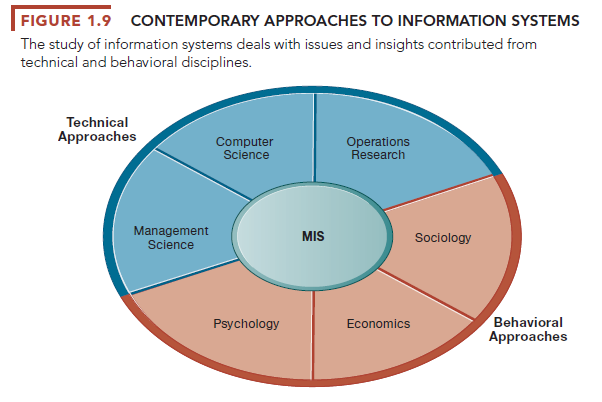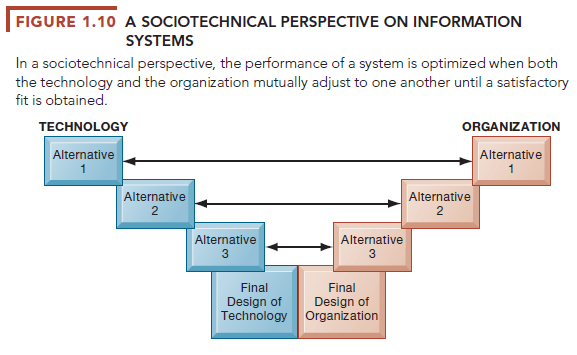The study of information systems is a multidisciplinary field. No single theory or perspective dominates. Figure 1.9 illustrates the major disciplines that contribute problems, issues, and solutions in the study of information systems. In general, the field can be divided into technical and behavioral approaches. Information systems are sociotechnical systems. Though they are composed of machines, devices, and “hard” physical technology, they require substantial social, organizational, and intellectual investments to make them work properly.
1. Technical Approach
The technical approach to information systems emphasizes mathematically based models to study information systems as well as the physical technology and formal capabilities of these systems. The disciplines that contribute to the technical approach are computer science, management science, and operations research.
Computer science is concerned with establishing theories of computability, methods of computation, and methods of efficient data storage and access. Management science emphasizes the development of models for decision-making and management practices. Operations research focuses on mathematical techniques for optimizing selected parameters of organizations, such as transportation, inventory control, and transaction costs.

2. Behavioral Approach
An important part of the information systems field is concerned with behavioral issues that arise in the development and long-term maintenance of information systems. Issues such as strategic business integration, design, implementation, utilization, and management cannot be explored usefully with the models used in the technical approach. Other behavioral disciplines contribute important concepts and methods.
For instance, sociologists study information systems with an eye toward how groups and organizations shape the development of systems and also how systems affect individuals, groups, and organizations. Psychologists study information systems with an interest in how human decision makers perceive and use formal information. Economists study information systems with an interest in understanding the production of digital goods, the dynamics of digital markets, and how new information systems change the control and cost structures within the firm.
The behavioral approach does not ignore technology. Indeed, information systems technology is often the stimulus for a behavioral problem or issue. But the focus of this approach is generally not on technical solutions. Instead, it concentrates on changes in attitudes, management and organizational policy, and behavior.
3. Approach of This Text: Sociotechnical Systems
Throughout this book, you will find a rich story with four main actors: suppliers of hardware and software (the technologists); business firms making investments and seeking to obtain value from the technology; managers and employees seeking to achieve business value (and other goals); and the contemporary legal, social, and cultural context (the firm’s environment). Together these actors produce what we call management information systems.
The study of management information systems (MIS) arose to focus on the use of computer-based information systems in business firms and government agencies. MIS combines the work of computer science, management science, and operations research with a practical orientation toward developing system solutions to real-world problems and managing information technology resources. It is also concerned with behavioral issues surrounding the development, use, and impact of information systems, which are typically discussed in the fields of sociology, economics, and psychology.
Our experience as academics and practitioners leads us to believe that no single approach effectively captures the reality of information systems. The successes and failures of information systems are rarely all technical or all behavioral. Our best advice to students is to understand the perspectives of many disciplines. Indeed, the challenge and excitement of the information systems field are that it requires an appreciation and tolerance of many different approaches.
The view we adopt in this book is best characterized as the sociotechnical view of systems. In this view, optimal organizational performance is achieved by jointly optimizing both the social and technical systems used in production.
Adopting a sociotechnical systems perspective helps to avoid a purely technological approach to information systems. For instance, the fact that information technology is rapidly declining in cost and growing in power does not necessarily or easily translate into productivity enhancement or bottom-line profits. The fact that a firm has recently installed an enterprise-wide financial reporting system does not necessarily mean that it will be used, or used effectively. Likewise, the fact that a firm has recently introduced new business procedures and processes does not necessarily mean employees will be more productive in the absence of investments in new information systems to enable those processes.

In this book, we stress the need to optimize the firm’s performance as a whole. Both the technical and behavioral components need attention. This means that technology must be changed and designed in such a way as to fit organizational and individual needs. Sometimes, the technology may have to be “de-optimized” to accomplish this fit. For instance, mobile phone users adapt this technology to their personal needs, and as a result manufacturers quickly seek to adjust the technology to conform to user expectations. Organizations and individuals must also be changed through training, learning, and planned organizational change to allow the technology to operate and prosper. Figure 1.10 illustrates this process of mutual adjustment in a sociotechnical system.
Source: Laudon Kenneth C., Laudon Jane Price (2020), Management Information Systems: Managing the Digital Firm, Pearson; 16th edition.

I have learn some just right stuff here. Definitely price bookmarking for revisiting. I wonder how a lot attempt you place to make the sort of fantastic informative site.
whoah this blog is excellent i love reading your articles. Keep up the good work! You know, a lot of people are looking around for this info, you could help them greatly.